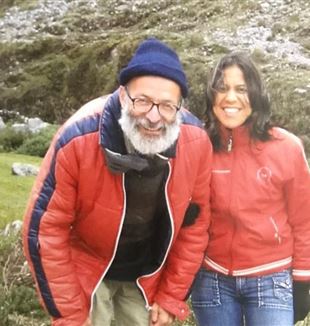
Andrea's truth
A portrait of the Servant of God Andrea Aziani, the Memor Domini missionary in Peru who died in 2008, by a former student and friend from Lima.I met Andrea Aziani in college, when I was just 17 years old. At the time, I was immersed in my studies in Educational Sciences and Andrea was one of the professors who taught Philosophy. I remember vividly my first day of class: he came into the classroom with a huge suitcase full of handouts, magazines and books. In one hand he carried a piece of chalk and in his coat pocket he kept a handkerchief that he used to wipe the blackboard with when necessary. After introducing himself, he wrote this question in large letters on the blackboard, "What is truth?" And he challenged us to answer it. That first meeting created a provocative and tense atmosphere; I could feel my heart pounding as his presence and penetrating gaze commanded respect. At the end of the class, my first thought was, "I want to be a teacher like him!" Although I did not have a clear answer to the truth question at the time, over time I discovered hints of it and learned the value of always asking questions, something Andrea constantly reminded us of in his lectures.
He taught us a lot. From respecting punctuality to demanding accountability in the classroom, his commitment to teaching was evident in every gesture. He encouraged us to read and make judgments without wasting a single second of class time. His attention towards all students was constant; his presence prevented any distraction or drowsiness. He also showed a deep respect for the institution and for authority, actively participating in all university initiatives, whether they were obstacle courses, lectures or extracurricular activities. Andrea not only showed us what a teacher should be like; his life and example embodied the model of engagement with all aspects of reality.
Topics covered in class elicited many questions from students, especially about concepts such as freedom, one of Andrea's favorites. When he explained the ideas of philosophers such as Nietzsche and compared them with those of other existentialists, his words had such intensity that some classmates and I thought he was a nihilist or an atheist because of the seriousness with which he delivered his lectures. Outside the classroom, discussions continued in the hallways, where Andrea would greet students and establish a personal dialogue with each person. This commitment to the learning and personal development of his students always touched me deeply.
As my college education progressed, I realized that freedom cannot be reduced to a simple concept; it is a process that requires the constant verification of life as a whole, just as Andrea taught us. He was the person who invited me to participate in extracurricular activities such as School of Community, cultural events and conferences. At first I hesitated to participate because of my many parish commitments, but curiosity eventually drove me to get more involved with this group of friends and peers.
My relationship with Andrea grew stronger over time, especially when, after graduation, I started working with him and Gian Corrado Peluso at the Catholic University "Sedes Sapientiae." Our working together meant another period of learning, in which Andrea constantly challenged me to express my opinions and to personally engage in things. In faculty meetings he always challenged claims about students' lack of commitment and understanding, always prioritizing the growth of us young people. His interest in my professional maturation was evident, as shown when he asked me to report on my
daily readings or my participation in conferences and events.
He guided me with wisdom and patience, even in difficult times. I remember one episode in particular. While I was working with Andrea there was a problem with a student, also from the movement. The situation was delicate and so I talked to Aziani about it. He listened to me, was amazed at this person's bad attitude, and yet he told me, "I do not know what you should do in this situation, but the only thing I ask is that your decision does not become reason for him to break his relationship with God."
Read also - The wooden cross by the sea
This response made me realize even more that what Andrea desired for the people he met was that they, too, would find Jesus and be able to save their lives.
This is exactly what happened to me: friendship with Andrea has deeply and lastingly impacted my life. From our first meeting in the classroom to the years working together at the university, his example of commitment, responsibility, and the constant search for truth have left an indelible mark on me. Thanks to his guidance and example, I learned not only the value of education and commitment to teaching, but also the importance of living authentically by seeking beauty in all things because – as he said, quoting Dostoevsky – "beauty will save the world."